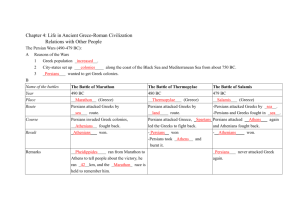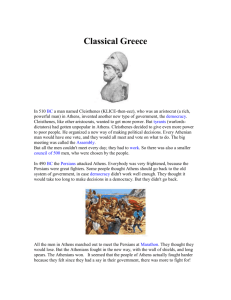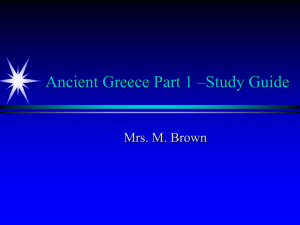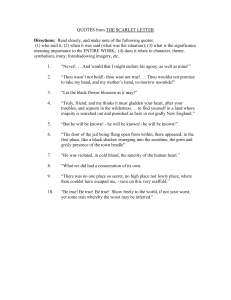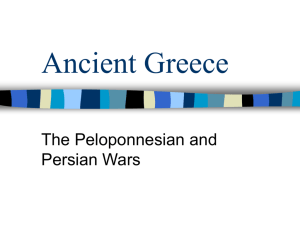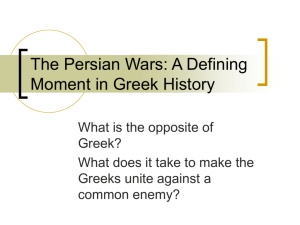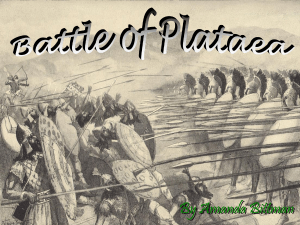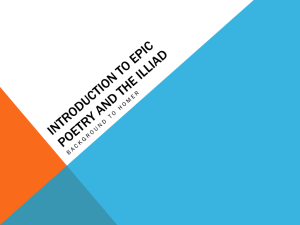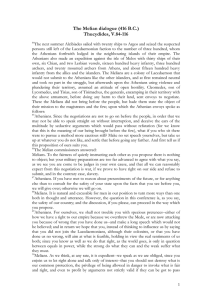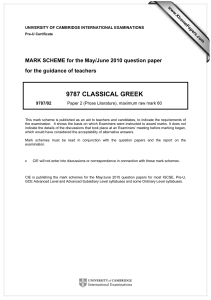Human Than Human
advertisement
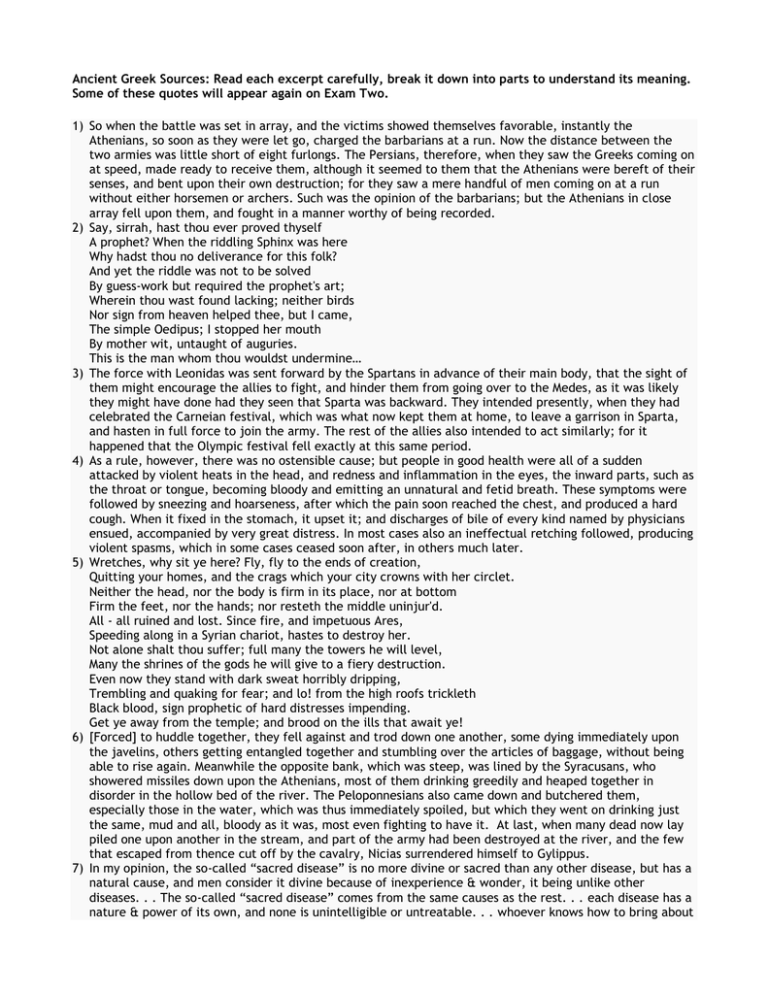
Ancient Greek Sources: Read each excerpt carefully, break it down into parts to understand its meaning. Some of these quotes will appear again on Exam Two. 1) So when the battle was set in array, and the victims showed themselves favorable, instantly the Athenians, so soon as they were let go, charged the barbarians at a run. Now the distance between the two armies was little short of eight furlongs. The Persians, therefore, when they saw the Greeks coming on at speed, made ready to receive them, although it seemed to them that the Athenians were bereft of their senses, and bent upon their own destruction; for they saw a mere handful of men coming on at a run without either horsemen or archers. Such was the opinion of the barbarians; but the Athenians in close array fell upon them, and fought in a manner worthy of being recorded. 2) Say, sirrah, hast thou ever proved thyself A prophet? When the riddling Sphinx was here Why hadst thou no deliverance for this folk? And yet the riddle was not to be solved By guess-work but required the prophet's art; Wherein thou wast found lacking; neither birds Nor sign from heaven helped thee, but I came, The simple Oedipus; I stopped her mouth By mother wit, untaught of auguries. This is the man whom thou wouldst undermine… 3) The force with Leonidas was sent forward by the Spartans in advance of their main body, that the sight of them might encourage the allies to fight, and hinder them from going over to the Medes, as it was likely they might have done had they seen that Sparta was backward. They intended presently, when they had celebrated the Carneian festival, which was what now kept them at home, to leave a garrison in Sparta, and hasten in full force to join the army. The rest of the allies also intended to act similarly; for it happened that the Olympic festival fell exactly at this same period. 4) As a rule, however, there was no ostensible cause; but people in good health were all of a sudden attacked by violent heats in the head, and redness and inflammation in the eyes, the inward parts, such as the throat or tongue, becoming bloody and emitting an unnatural and fetid breath. These symptoms were followed by sneezing and hoarseness, after which the pain soon reached the chest, and produced a hard cough. When it fixed in the stomach, it upset it; and discharges of bile of every kind named by physicians ensued, accompanied by very great distress. In most cases also an ineffectual retching followed, producing violent spasms, which in some cases ceased soon after, in others much later. 5) Wretches, why sit ye here? Fly, fly to the ends of creation, Quitting your homes, and the crags which your city crowns with her circlet. Neither the head, nor the body is firm in its place, nor at bottom Firm the feet, nor the hands; nor resteth the middle uninjur'd. All - all ruined and lost. Since fire, and impetuous Ares, Speeding along in a Syrian chariot, hastes to destroy her. Not alone shalt thou suffer; full many the towers he will level, Many the shrines of the gods he will give to a fiery destruction. Even now they stand with dark sweat horribly dripping, Trembling and quaking for fear; and lo! from the high roofs trickleth Black blood, sign prophetic of hard distresses impending. Get ye away from the temple; and brood on the ills that await ye! 6) [Forced] to huddle together, they fell against and trod down one another, some dying immediately upon the javelins, others getting entangled together and stumbling over the articles of baggage, without being able to rise again. Meanwhile the opposite bank, which was steep, was lined by the Syracusans, who showered missiles down upon the Athenians, most of them drinking greedily and heaped together in disorder in the hollow bed of the river. The Peloponnesians also came down and butchered them, especially those in the water, which was thus immediately spoiled, but which they went on drinking just the same, mud and all, bloody as it was, most even fighting to have it. At last, when many dead now lay piled one upon another in the stream, and part of the army had been destroyed at the river, and the few that escaped from thence cut off by the cavalry, Nicias surrendered himself to Gylippus. 7) In my opinion, the so-called “sacred disease” is no more divine or sacred than any other disease, but has a natural cause, and men consider it divine because of inexperience & wonder, it being unlike other diseases. . . The so-called “sacred disease” comes from the same causes as the rest. . . each disease has a nature & power of its own, and none is unintelligible or untreatable. . . whoever knows how to bring about moistness, dryness, hotness or coldness in men can cure this disease as well, if he can diagnose how to bring these together properly, and he has no need of purifications & magic. 8) The Grecian navy circled them around With fierce assault; and rushing from its height The inverted vessel sinks: the sea no more Wears its accustomed aspect, with foul wrecks And blood disfigured; floating carcasses Roll on the rocky shores: the poor remains Of the barbaric armament to flight Ply every oar inglorious: onward rush The Greeks amid the ruins of the fleet, As through a shoal of fish caught in the net, Spreading destruction: the wide ocean o'er Wailings are heard, and loud laments, till night With darkness on her brow brought grateful truce. 9) In my opinion, while nearly all the arts have advanced, nothing has undergone greater change and development from the old days then the art of war. . . You will also have heard that Philip roams at will not because of his phalanx of hoplites, but because he campaigns with light-armed troops, cavalry, archers, mercenaries, and the like. When he uses these to attack a state suffering from factional disorder, and when mutual distrust prevents anyone from going out to defend its lands, he brings up his siege machinery and besieges the city. And I don’t have to tell you that “summer” or “winter” makes no difference to him; he campaigns at any time of the year he pleases. 10) As regards walls, those that argue that cities which place special emphasis on bravery should not have them, hold too old fashioned a view… To choose not to build walls around a city is like selecting a site for a city that makes it easy to invade and clearing away the high ground. It would be similar to not providing walls for a private dwelling on the grounds that such walls would make its inhabitants cowardly. Match the correct primary source quotations above with the descriptions below. [NOT to hand in] A) Herodotus describes the Athenians running across the battlefield at Marathon and shocking their Persian opponents. There have been questions about how far heavily armored hoplites could realistically run. B) Aristotle explains the practical necessity of building fortifications around a city to protect it. Building them does not the inhabitants cowardly. [Politics 7:1330-1331] C) Hippocrates or one of his followers explains that all diseases, including epilepsy, have natural causes and treatments. [On the Sacred Disease] D) Thucydides on the aftermath of the Athenians’ campaign to Sicily [History of the Peloponnesian War 7:84-85] E) Demosthenes notes the dramatic changes in warfare, particularly those of the Macedonian king to the north of Greece. [Philippic 3:47-50 (ca. 341 B.C.)] F) Herodotus explains why the Spartan forces, led by their king, were delayed in making it to meet the invading Persian army of Xerxes [Histories 7.206] G) Aeschylus describes the naval triumph of the Greeks over the Persians at the battle of Salamis [The Persians (ca. 472 B.C.)] H) Oedipus speaks to the blind seer, Teiresias, about all the things he’s done for Thebes [Oedipus the King (ca. 425 B.C.)] I) First report of the oracle at Delphi, according Herodotus, after the Athenians have heard about Xerxes’ invading army [Histories 7.140] J) Thucydides describes the symptoms of the epidemic disease that devastated Athens in 430 B.C. [History of the Peloponnesian War 2:49] How Art Made the World: More Human Than Human MAIN QUESTION: Why is our world dominated by unrealistic images of the human body? CLUES TO ANSWERING THE QUESTION: 1) How might the behavior of seagulls help explain the unrealistic features of the Venus of Willendorf? V. S. Ramachandran’s theory? herring gull chicks & the red-striped stick? hunter gatherers & hard-wired instincts? 2) How are ancient Egyptian images of the human body unrealistic & why did these images stay unchanged for so long? Ramose’s tomb? specific cultural characteristics? 3) Why were the ancient Greeks obsessed with the human body & how did they go so quickly from small figurines to life-size realistic sculptures? Psammeticus’ role & connection to Egypt? Kritian boy’s significance (ca. 480 B.C.)? 4) Why did the Greeks abandon realistic images of the human body only a generation after Kritian boy? principles of Polyclitus (ca. 450 B.C.)? Stefano Mariottini’s discovery? unrealistic features of the Riace bronze warriors?
